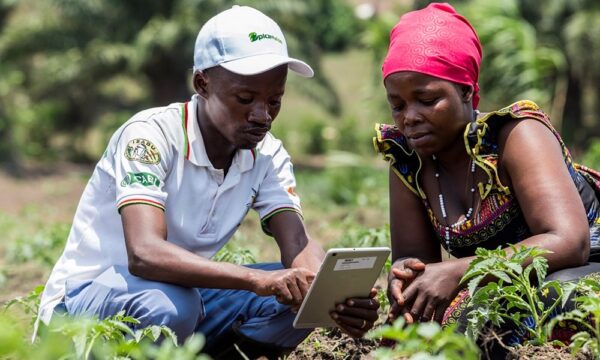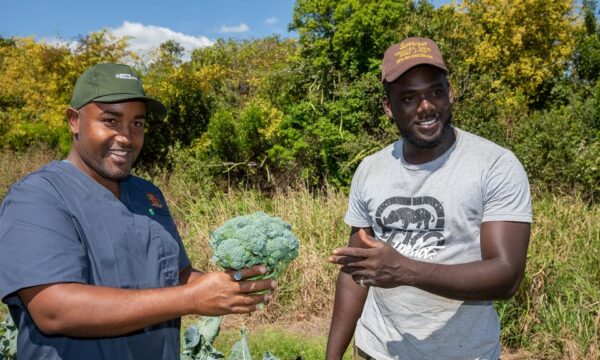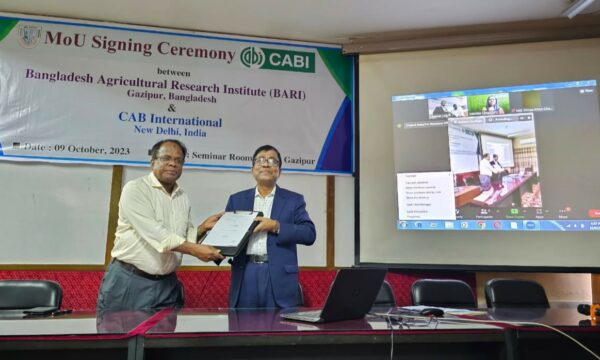Contributed by Rachel Winks, CABI.
The partner organisations of the Tropical Agriculture Platform (TAP) met in Kigali, Rwanda, on 19-21 January to agree a new concept for agricultural innovation: the common framework on capacity development for agricultural innovation systems. With growing global population and increased food demand, agricultural innovation can help improve food security, increase farmers’ incomes and protect use of natural resources. CABI has been a key contributor to the agricultural innovation framework, bringing valuable experience of its Plantwise food security programme to the platform.
The common framework includes concepts, methodologies, principles and tools to help people better understand and harness agricultural innovation. It emphasizes interconnectedness and the importance of bringing individuals and organisations together to co-create new knowledge.
CABI CEO, Dr Trevor Nicholls, who has been on TAP’s steering committee since its creation in 2013, attended the partners’ meeting. “This innovation framework really resonated with me,” said Dr Nicholls. “It brings to mind strategies we developed and applied when implementing our global Plantwise food security programme. I can see how this innovation framework will help CABI in future, as well as others wanting to unlock agricultural transformation at scale.”
In Rwanda, Dr Nicholls took the opportunity to meet with senior officials including Permanent Secretary for Agriculture, Mr Innocent Musabyimana, and Director General of the Rwanda Agriculture Board (RAB), Dr Louis Butare. The group visited major CABI-led agricultural projects in Rwanda, including Plantwise, that provide climate smart support to small-scale farmers.
In Rwanda, most people live in rural communities. Agriculture is important for economic growth and poverty reduction, but farmers lose around 30-70% of the food they grow to plant pests and diseases. The Plantwise plant clinics, run by trained plant doctors, give small-scale farmers in rural communities access to practical information, helping them grow more and lose less of their produce.
Dr Nicholls and Rwandan officials visited a plant clinic in Kinkanga in the Huye District of Rwanda. At this e-clinic, plant doctors explained how technology is revolutionising the way they deliver plant health information. Tablets loaded with data and factsheets are helping plant doctors give more accurate diagnoses. Furthermore, SMS messaging means they can share more information more widely.
Dr Nicholls said: “Technology is the key to reaching people at scale. Even with a relatively high density of plant clinics, not all farmers can attend one. A farmer I met on this trip said his local plant clinic was too far away to visit, but he had a mobile phone. We have to extend the reach of Plantwise using mobile technology. ”
Plantwise has now launched 66 plant clinics in Rwanda. The initiative has been enthusiastically adopted by the Ministry of Agriculture and RAB, whilst local Districts are now setting up clinics using their own funds. Dr Butare commented how happy RAB is that farmers have embraced the Plantwise initiative. Mr Musabyimana commented on Plantwise as a key pillar of agricultural innovation in Rwanda.
The group also visited the Agri-TT soil pest project in Rubona. With funding from DfID in the UK and technology from China, a team of scientists from Africa, China, Switzerland and the UK is working with RAB to give farmers an environmentally-friendly way of controlling soil pests in vegetable crops.
This international collaboration has successfully transferred the technology from China to Rwanda, concentrating on the use of locally occurring beneficial worms (nematodes) to control soil pests. A nematode production facility has been created, and the project is laying the foundations for scaling out in Rwanda and potentially across East Africa.
Projects like Agri-TT and Plantwise are helping to bring agricultural innovation to rural communities, but they are also connecting agricultural experts to help them innovate on a global level.
Dr Nicholls said: “I was struck how agricultural innovation connects people globally. Agri-TT brings our scientists in China to Rwanda. RAB scientists recently visited a facility in China. A Rwandan plant doctor, Martin Busobozi, is currently studying integrated crop management at a CABI-led degree course in Switzerland. Bellancile Uzayisenga is Head of the Crop Protection Programme for RAB but has also recently visited Australia as part of the Australia-Africa plant biosecurity partnership, of which CABI is the key implementing agency in Africa.”
Related News & Blogs
Plant clinics showcased at Harvest Money Expo in Uganda to help empower the country’s young smallholder farmers
The CABI-led PlantwisePlus programme showcased its plant clinics at the Harvest Money Expo in Uganda to help empower the country’s young smallholder farmers to grow more and lose less to potentially devastating crop pests and diseases. The Harvest Mone…
22 March 2024




